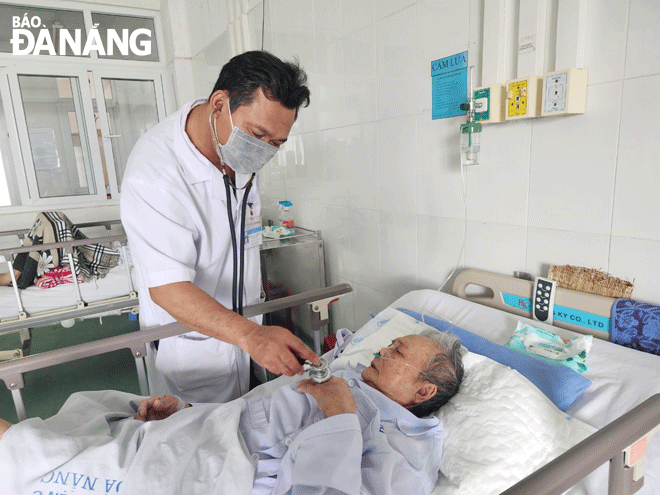Da Nang accelerates digital transformation in healthcare industry
Digital transformation in the health sector is a policy realised by the national government through projects and decrees, with the aim of improving the quality of medical examination and treatment services, bringing satisfaction and efficiency for both in/out-patients and medical staff. Over the past years, the city's health sector has promoted the implementation of many digital transformation activities with specific goals, significantly contributing to improving service quality and meeting the roadmap for implementing the digital transformation project in the city.
 |
| Digital transformation helps to improve efficiency in medical examination and treatment activities. A doctor examines patient under treatment at the Da Nang General Hospital. Photo: PHAN CHUNG |
Over the years, medical examination and treatment procedures at the Da Nang General Hospital have been streamlined as much as possible. The application of information technology (IT) in medical examination and treatment is one of the main factors that make a difference.
According to doctor Nguyen Thanh Trung, Deputy Director of the Da Nang General Hospital, the hospital has actively upgraded infrastructure, built up software and improved processes to better apply IT. This helps patients book online appointments whilst information on in-patient and out-patient medical examination and treatment, indications and the results of paraclinical performance, the management of treatment regimens, medication management, medical supplies, hospital fee payments, health insurance are fully updated. In addition, the hospital manages electronic medical records, instead of paper-based ones as previously, and uses artificial intelligence (AI) in imaging diagnostics and online payments.
“The hospital also connects data to share information about diagnostic imaging, contributing to improving capacity, efficiency, quality and optimising the medical examination and treatment process in a faster and more accurate transparent manner at medical facilities for the sake of better taking care of people's health,” said doctor Trung.
This trend is also being applied effectively in many other medical facilities. According to the Da Nang Department of Health, many other hospitals in the city have been invested in IT infrastructure quite well such as the Da Nang Oncology Hospital and the Da Nang Maternity - Paediatrics Hospital. These facilities are equipped with cameras, server rooms and IT human resources. Over the past years, the city’s health sector has put into use digital databases such as the management of medical examination and treatment data, citizens’ health records, data on medical and pharmaceutical practice establishments, medical equipment, treatment regimens and scientific research.
According to doctor Tran Thanh Thuy, the Deputy Director in charge of the Da Nang Department of Health, digital transformation is an urgent and long-term task. At present, 100% of the in-coming and out-going documents are carried out online; 100% of the public service provision reaches level 4; 100% of the medical examination and treatment facilities have HIS hospital management software system and some units deploy LIS and PACS systems; 100% of health stations use unified management software; 100% of the pharmacies connect to the ‘national pharmacy database’ system.
By 2025, 100% of the medical facilities will deploy non-cash electronic payments; 100% of the medical examination and treatment facilities will implement online registration of medical examination and treatment; 50% of the hospitals will successfully deploy electronic medical records and the payment of non-cash electronic hospital fees.
In addition, the city's health sector also sets a vision of the digital transformation of the health sector by 2030, which is the application of digital technology in the operations and services of the city's health sector, forming the smart healthcare industry with three main contents: smart disease prevention, smart medical examination and treatment, and smart health management.
"Digital transformation aims to help managers to operate the system effectively so that medical staff can improve their professional qualifications and manage their work effectively and people have convenient and quality access to good-quality medical services," said doctor Thuy.
Reporting PHAN CHUNG - Translating by A.THU








